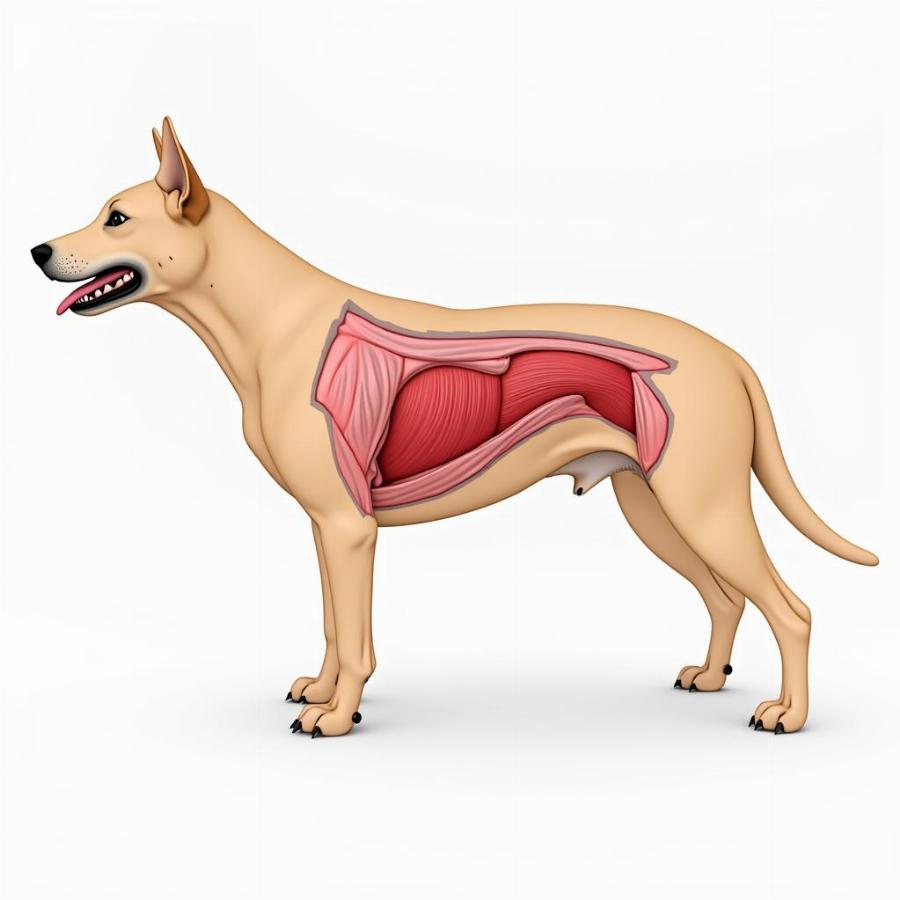Anal gland issues in dogs can be a smelly and uncomfortable problem. From scooting across the carpet to excessive licking, the signs are often clear that something’s not right. Many dog owners turn to anal gland supplements as a potential solution. This comprehensive guide will explore everything you need to know about anal gland supplements for dogs, from how they work to choosing the right one for your furry friend.
Understanding Anal Gland Issues in Dogs
Before diving into supplements, it’s important to understand why anal glands become problematic. Located on either side of your dog’s anus, these small sacs contain a foul-smelling fluid that’s typically expressed during bowel movements. However, sometimes these glands can become impacted or infected, leading to discomfort and even abscesses. Factors like diet, allergies, and even obesity can contribute to these issues.
 Dog Anal Glands Diagram
Dog Anal Glands Diagram
What are Anal Gland Supplements for Dogs?
Anal gland supplements are designed to support healthy anal gland function. They typically contain a blend of fiber, probiotics, and digestive enzymes. The idea is that these ingredients can help bulk up the stool, promoting natural expression of the anal glands during defecation. They may also include ingredients to support a healthy gut microbiome, which can indirectly improve anal gland function.
Do Anal Gland Supplements Really Work?
The effectiveness of anal gland supplements can vary from dog to dog. While some pet owners report significant improvements, others see little to no change. It’s crucial to remember that these supplements aren’t a guaranteed fix for all anal gland problems. In some cases, underlying medical conditions might be contributing to the issue, requiring veterinary intervention.
Choosing the Right Anal Gland Supplement
The market offers a variety of anal gland supplements. Look for products that contain high-quality ingredients and are specifically formulated for anal gland health. Consider consulting your veterinarian for personalized recommendations based on your dog’s breed, size, and overall health. They can help determine if a supplement is appropriate and recommend the best option.
How to Use Anal Gland Supplements
Always follow the dosage instructions provided by the manufacturer. Typically, you’ll mix the supplement into your dog’s food. Be patient, as it may take several weeks to see noticeable results. If your dog’s anal gland problems persist or worsen, consult your veterinarian.
What Can I Feed My Dog to Help Express His Glands? Adding Fiber to Your Dog’s Diet
Adding fiber to your dog’s diet can be a beneficial step towards naturally expressing their glands. Learn about different high-fiber foods to help dogs express glands and how they contribute to better digestive health.
Natural Remedies for Anal Gland Issues
Besides supplements, other natural remedies can support anal gland health. These include increasing fiber intake through canned pure pumpkin for dogs or adding psyllium husk to their food. Regular exercise can also help stimulate bowel movements and encourage natural expression. For persistent issues, or if you notice signs of infection, consult your vet. Discover more natural remedies for smelly dogs and how to tackle unpleasant odors effectively.
How to Get Rid of Dog Gland Smell?
Dealing with the unpleasant odor associated with anal gland issues can be challenging. Find effective solutions and tips on how to get rid of dog gland smell and keep your home fresh and clean.
When to See a Vet
While supplements can be helpful, it’s essential to recognize when professional help is needed. If your dog exhibits signs of anal gland impaction or infection, such as excessive licking, scooting, or a foul odor, consult your veterinarian. They can manually express the glands and address any underlying medical conditions. For specific eye-related concerns in dogs, you might want to know more about diclofenac eye drops for dogs and their usage.
Conclusion
Anal gland supplements can be a valuable tool in managing your dog’s anal gland health, particularly when combined with a fiber-rich diet and regular exercise. Remember to choose a high-quality supplement and consult your veterinarian for personalized guidance. With the right approach, you can help your furry friend stay comfortable and odor-free!
FAQs
-
How often should I give my dog an anal gland supplement? Follow the manufacturer’s instructions for dosage and frequency.
-
Can I use anal gland supplements for cats? No, these supplements are formulated specifically for dogs.
-
Are there any side effects of anal gland supplements? Some dogs might experience mild digestive upset, such as loose stools.
-
What should I do if my dog’s anal glands are infected? Consult your veterinarian immediately.
-
Can I express my dog’s anal glands myself? It’s best to leave this procedure to a trained professional to avoid injury.
-
Are certain dog breeds more prone to anal gland problems? Yes, smaller breeds are often more susceptible.
-
Can diet affect anal gland health? Absolutely, a lack of fiber can contribute to anal gland issues.
Further Questions & Resources
- How to choose the best dog food for anal gland health?
- Understanding the different types of anal gland infections.
Beaut Dogs is your go-to resource for all things related to dog care, providing reliable and in-depth information to help you be the best pet parent possible. From breed-specific guides to expert advice on health and nutrition, we’re here to support you and your furry friend. When you need assistance, feel free to reach out to us via Email at [email protected] for detailed and accurate answers. We encourage you to explore more resources available at https://beautdogs.com to ensure your dog receives the best possible care.